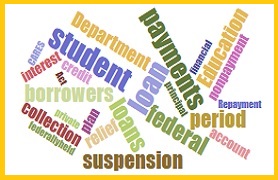Industries
Attorneys
How Does COVID-19 Affect Your Student Loans?
 Roughly forty-five million people in the United States are indebted to the federal government through federal student loans, whether it’s for assistance with obtaining a college degree or other miscellaneous expenses that coincide with one’s education. For many individuals, student loans are a large part of financial stress, with an even greater concern during times where one may become unemployed due to unforeseen circumstances, rendering repayment impossible. To ensure financial relief for federal student loan borrowers, the Coronavirus Aid, Relief, and Economic Security (CARES) Act was enacted, which made substantial adjustments to guidelines regarding federal student loans.
Roughly forty-five million people in the United States are indebted to the federal government through federal student loans, whether it’s for assistance with obtaining a college degree or other miscellaneous expenses that coincide with one’s education. For many individuals, student loans are a large part of financial stress, with an even greater concern during times where one may become unemployed due to unforeseen circumstances, rendering repayment impossible. To ensure financial relief for federal student loan borrowers, the Coronavirus Aid, Relief, and Economic Security (CARES) Act was enacted, which made substantial adjustments to guidelines regarding federal student loans.
Suspension Period/Deferred Payments
The CARES Act provides an automatic suspension of all payments, principal and interest, on federally-held student loans through September 30, 2020. The student loan provisions of the act are only directed at federally-held loans, which are loans that are owned by the U.S. Department of Education. Since the U.S. Department of Education does not have legal authority over private student loans, they are not covered under this designated provision of the act. If you continue to make payments to your loan account balance during the suspension period, any payments made will be used to pay down principal and any previously accrued interest.
For borrowers who are currently on a Public Service Loan Forgiveness plan, or pursuing one, suspended payments will be acknowledged as though you made on-time monthly payments, so you will not be penalized for nonpayment during the suspension period. Similarly, borrowers who are currently on an Income-Driven Repayment plan, suspended payments will be considered qualifying payments that count toward your forgiveness plan and thus also will not be penalized for nonpayment during the suspension period. If you are unsure whether your student loan is eligible for interest deferral, you should contact your loan servicer. If you know your student loan is eligible, you do not need to do anything to initiate the process, your loan servicer will automatically adjust your account to reflect the provided modifications.
Credit Agency Reporting
During the suspension period, payments must be reported to credit agencies as if they were made, meaning nonpayment during this period cannot be used to affect credit scores. This requires the U.S. Department of Education to report your student loan account as current, even if no payments have been made during the administrative forbearance.
Collection Efforts
During the suspension period, the U.S. Department of Education has halted involuntary collection efforts on defaulted federal student loans, including any wage garnishment, seizure of tax refunds or any other Treasury offset. Additionally, Department-contracted private collection agencies are mandated to stop making collection calls and sending letters or statements to student loan borrowers who are in default.
Proposed Legislation
In providing more relief to federal student loan borrowers, a proposal was raised that would require the U.S. Department of Education to make payments on behalf of all federal student loan borrowers during the national emergency period for a minimum of $10,000 per loan. This would mean a guaranteed cancellation of at least $10,000 in federal student loan debt for all borrowers. However, this provision has not passed Congress, so it is currently not considered an alternative relief mechanism.
Should you have any questions regarding how current laws may affect your student loans, please contact Mark H. Boss.
Taylor L. Smead, a law clerk with Eastman & Smith who is finishing her third year at the University of Toledo College of Law, contributed to this article.
___________________
Disclaimers:
At the date of publication the above information was correct. It is quite possible the information above has changed as COVID-19 is a rapidly evolving situation.
The article in this publication has been prepared by Eastman & Smith Ltd. for informational purposes only and should not be considered legal advice. This information is not intended to create, and receipt of it does not constitute, an attorney/client relationship.
